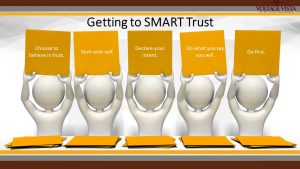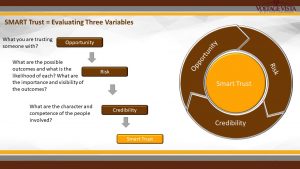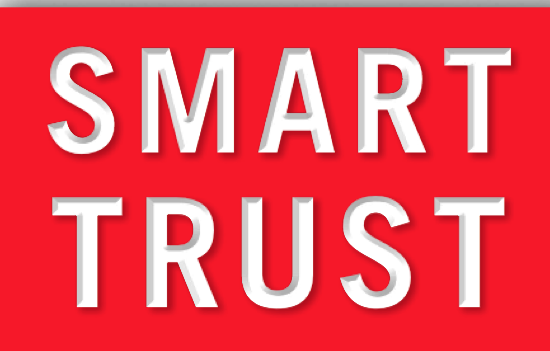 The authors push you to reconcile your assumptions about the trustworthiness of people with the idea that your trust default position significantly impacts your relationships: essentially, your own biases and predispositions affect how you approach relationship-building and assess trustworthiness. Readers are challenged to own their assumptions about people and to acknowledge that the same spoon they feed others from is likely to be the same spoon that will be used to feed them: it’s a type of Pygmalion Effect (self-fulfilling prophesy). Moreover, as readers grapple with the idea of “trust risk” and reciprocity, they will have to ask themselves whether they are brave enough to take the leap to extend trust. This means intentionally choosing to be vulnerable and creating trust test cases undergirded by situational analysis in order to improve judgment, which is where the distinction lies between being gullible and “smart trust.” Finally, readers will ask themselves whether they are authentic both on and off the clock and how trust (or the lack thereof) impacts their overall mental and emotional health and wellness, which is central to effective leadership.
The authors push you to reconcile your assumptions about the trustworthiness of people with the idea that your trust default position significantly impacts your relationships: essentially, your own biases and predispositions affect how you approach relationship-building and assess trustworthiness. Readers are challenged to own their assumptions about people and to acknowledge that the same spoon they feed others from is likely to be the same spoon that will be used to feed them: it’s a type of Pygmalion Effect (self-fulfilling prophesy). Moreover, as readers grapple with the idea of “trust risk” and reciprocity, they will have to ask themselves whether they are brave enough to take the leap to extend trust. This means intentionally choosing to be vulnerable and creating trust test cases undergirded by situational analysis in order to improve judgment, which is where the distinction lies between being gullible and “smart trust.” Finally, readers will ask themselves whether they are authentic both on and off the clock and how trust (or the lack thereof) impacts their overall mental and emotional health and wellness, which is central to effective leadership.
If I were forced to give you only two key takeaways from the book, I’d choose the content below. The first slide, “Getting to SMART Trust” reflects not only the Five Components of SMART Trust put forth by the author, but each component is also tethered to one of
Daniel Goleman‘s aspects of emotional intelligence. In particular, they are easily connected to self-awareness and self-regulation (the remaining three components are empathy, intrinsic motivation, and social skills (purposeful social connection)). Leaders who lack emotional intelligence, as assessed by the teams that report to them, are less effective in terms of earnings, influence, and opportunities for advancement. The second slide, “SMART Trust = Evaluating Three Variables” represents the question framework for determining what is at stake when deciding to extend trust to someone, especially if your trust has been broken in the past. The answers to these questions will also help guide the conversations you should have in the event you decide to extend trust again (If you are unwilling to terminate the person from your team or marginalize them in your life, you should be willing to extend SMART Trust. Further, if you are unwilling to extend trust, you should be able and willing to explain your rationale and clarify to the person what their new role, purpose, and potential on the team or in your life).


The tough questions are SMART Trust make it clear that if a leader must do internal work before they can do the external work of thinking well about others in order to help them see a path forward and be confident in their relationship with you.

 The authors push you to reconcile your assumptions about the trustworthiness of people with the idea that your trust default position significantly impacts your relationships: essentially, your own biases and predispositions affect how you approach relationship-building and assess trustworthiness. Readers are challenged to own their assumptions about people and to acknowledge that the same spoon they feed others from is likely to be the same spoon that will be used to feed them: it’s a type of Pygmalion Effect (self-fulfilling prophesy). Moreover, as readers grapple with the idea of “trust risk” and reciprocity, they will have to ask themselves whether they are brave enough to take the leap to extend trust. This means intentionally choosing to be vulnerable and creating trust test cases undergirded by situational analysis in order to improve judgment, which is where the distinction lies between being gullible and “smart trust.” Finally, readers will ask themselves whether they are authentic both on and off the clock and how trust (or the lack thereof) impacts their overall mental and emotional health and wellness, which is central to effective leadership.
The authors push you to reconcile your assumptions about the trustworthiness of people with the idea that your trust default position significantly impacts your relationships: essentially, your own biases and predispositions affect how you approach relationship-building and assess trustworthiness. Readers are challenged to own their assumptions about people and to acknowledge that the same spoon they feed others from is likely to be the same spoon that will be used to feed them: it’s a type of Pygmalion Effect (self-fulfilling prophesy). Moreover, as readers grapple with the idea of “trust risk” and reciprocity, they will have to ask themselves whether they are brave enough to take the leap to extend trust. This means intentionally choosing to be vulnerable and creating trust test cases undergirded by situational analysis in order to improve judgment, which is where the distinction lies between being gullible and “smart trust.” Finally, readers will ask themselves whether they are authentic both on and off the clock and how trust (or the lack thereof) impacts their overall mental and emotional health and wellness, which is central to effective leadership.




